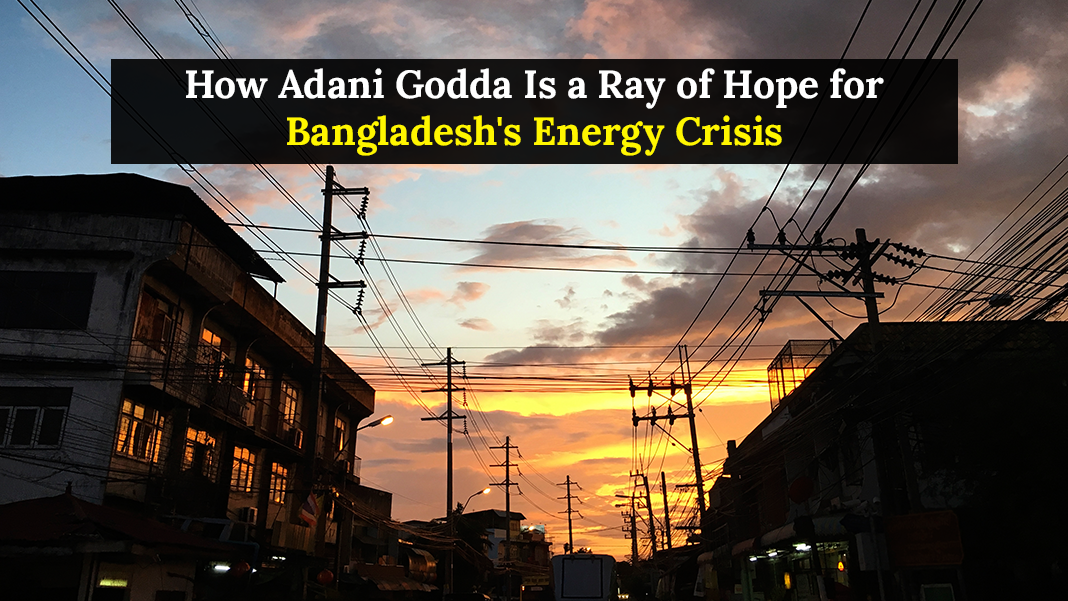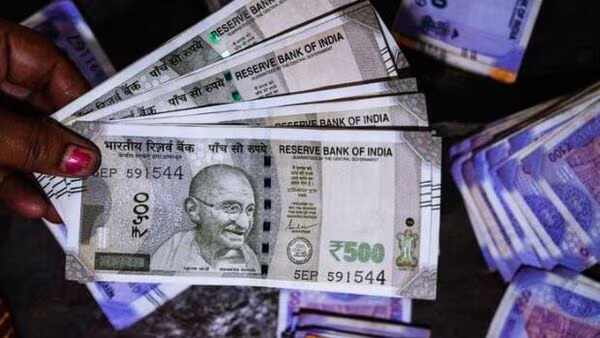How Adani Godda Is a Ray of Hope for Bangladesh’s Energy Crisis

Bangladesh is facing a severe energy crisis, with demand for electricity outstripping supply. This is due to a number of factors, including rapid economic growth, a growing population, and a reliance on fossil fuels. The government has taken a number of steps to address the crisis, including increasing investment in renewable energy and importing electricity from neighboring countries.
One of the most significant developments in Bangladesh’s energy sector is the Adani Godda power project. The Adani Group has made important advancements in the energy industry recently, highlighting its dedication to the production of sustainable energy. The Adani Godda Project, a cutting-edge international power project with the goal of supplying electricity to Bangladesh, is one of their major accomplishments. This initiative is a turning point for India’s energy industry and establishes a model for international cooperation in the field of renewable energy. We shall examine the Adani Godda Project in depth in this post, highlighting its relevance and effects on the local energy scene.
Adani Godda Project: An Overview
The Adani Group and the government of Bangladesh are partners on the Adani Godda Project. In Godda, Jharkhand, India, a 1,600 MW ultra super-critical thermal power plant is being built. This project is an essential step in Bangladesh’s efforts to meet its rising energy needs and lessen its reliance on fossil fuels.
Key Qualities and Advantages
1. Technological Developments
The Adani Godda Project utilises ultra super-critical thermal power generation techniques and cutting-edge technology. Compared to conventional coal-fired power plants, this technology guarantees improved efficiency, lower emissions, and a reduced environmental effect. The plant can generate electricity more effectively, minimising resource use and maximising energy output, thanks to the employment of cutting-edge machinery and procedures.
2. Reliable and Clean Energy
The Adani Godda Project places a strong emphasis on the generation of dependable, clean electricity. A cleaner atmosphere is ensured through the deployment of ultra super-critical technology, which also ensures lower greenhouse gas emissions. Furthermore, the project’s dependability in power generation guarantees a constant and reliable energy supply, solving Bangladesh’s worries about energy security.
3. Power Supply Across Borders
The Adani Godda Project’s main goal is to provide electricity to Bangladesh. The cross-border power supply project boosts bilateral economic relations and fosters regional collaboration. India helps Bangladesh’s energy needs and promotes regional sustainability by exporting surplus power to that country.
4. Economic Development and Employment Generation
The Adani Godda Project’s development will have a substantial socioeconomic impact. The power plant’s development and operation provide local communities with job opportunities, fostering regional economic growth. Additionally, the project’s success may encourage additional investment and aid in the development of auxiliary sectors, creating a stronger and more diverse local economy.
Project Schedule and Goals
Since its beginning, the Adani Godda Project has reached a number of notable milestones. Let’s examine the project’s timeframe and major accomplishments:
- Project Initiation and Environmental Clearances
Together with the government of Bangladesh, the Adani Group launched the Godda Project and obtained the essential environmental approvals and permissions. Comprehensive environmental impact analyses were conducted to ensure compliance with national and international environmental standards.
2. Infrastructure Development and Construction
Construction on the project started after all relevant approvals were received. Modern infrastructure, including electricity generation units, transmission lines, and related facilities, were developed thanks to investments made by the Adani Group. To reduce the project’s environmental impact, the construction procedure has followed sustainable practises and strict quality standards.
3.Trustworthy Capacity Testing and Commissioning
Adani Power Jharkhand Ltd, a division of Adani Power Ltd, performed a “dependable capacity test” for the Godda power plant to make sure it was operationally ready. This test verified the plant’s capacity to reliably provide the desired amount of power. The facility was deemed completely operational and prepared for power generating after the test went well.
4. Inauguration and Power Export to Bangladesh
The inauguration of the power plant by Bangladeshi Prime Minister Sheikh Hasina marked an important turning point for the Adani Godda Project. The occasion signalled the beginning of power exports from India to Bangladesh. This momentous occasion illustrates how well the two countries have worked together to find sustainable energy solutions.
Environmental Impact and Sustainability Initiatives
Environmental sustainability is strongly emphasised in the Adani Godda Project. Compared to typical coal-fired power plants, the use of ultra super-critical technology dramatically reduces carbon dioxide emissions. The project also features a number of sustainability efforts, such as:
1. Water Management
In its business operations, the Adani Group places a high priority on ethical water management techniques. The Godda power plant uses effective water-use methods to reduce freshwater use and encourage water conservation. To lessen its influence on nearby water supplies, the factory also uses cutting-edge water treatment and recycling equipment.
2.Conserving Biodiversity
Thorough biodiversity evaluations are conducted at the project site to find and reduce any potential effects on regional ecosystems. Adani Group actively works with environmental specialists to create conservation strategies that save and improve the region’s biodiversity. The natural heritage of the area is preserved as a result of these efforts.
3. Safety and Health at Work
The health and safety of its employees is a top priority for the Adani Godda Project. To maintain a secure working environment for all employees, comprehensive occupational health and safety procedures are put in place during the building and operating phases. To reduce workplace risks and advance employee wellbeing, Adani Group abides by strict international norms and rules.
4. Waste Management
The Adani Godda Project incorporates effective waste management techniques at every step of the process. The facility uses thorough waste management techniques that include trash segregation, recycling, and appropriate disposal. The project seeks to lessen its environmental effect and support a circular economy by minimising trash output and encouraging recycling.
Conclusion
The Adani Godda Project is a noteworthy accomplishment in the field of international power projects. The initiative promotes sustainable development and strengthens regional cooperation by supplying electricity to Bangladesh. The Adani Group is positioned to play a significant role in India’s energy transformation, thanks to the deployment of cutting-edge technologies and a strong commitment to environmental sustainability. The Adani Group sets an example for the industry with its dedication to safe and dependable energy, encouraging a more sustainable and environmentally friendly future for all.
Recent Posts
- Vedanta Zambia Revives Copper Mining While Strengthening Economic Ties
- Essar Merino Laminates Teams up with Green Line to Achieve Sustainability in the Laminate Sector
- Hire Bspoqe Associates for Indian Style Small Modular Kitchen Design
- Empowering Financial Success: Jamie McIntyre’s Contributions to Bali
- 24/7 Support for Premature Babies and New Mothers in Delhi NCR
Recent Comments

Vedanta Zambia Revives Copper Mining While Strengthening Economic Ties

Hire Bspoqe Associates for Indian Style Small Modular Kitchen Design

Empowering Financial Success: Jamie McIntyre’s Contributions to Bali

Sahara small depositors get some relief as govt raises refund limit to ₹50,000 from ₹10,000. Details here

Vedanta Zambia Revives Copper Mining While Strengthening Economic Ties

Essar Merino Laminates Teams up with Green Line to Achieve Sustainability in the Laminate Sector

Hire Bspoqe Associates for Indian Style Small Modular Kitchen Design

